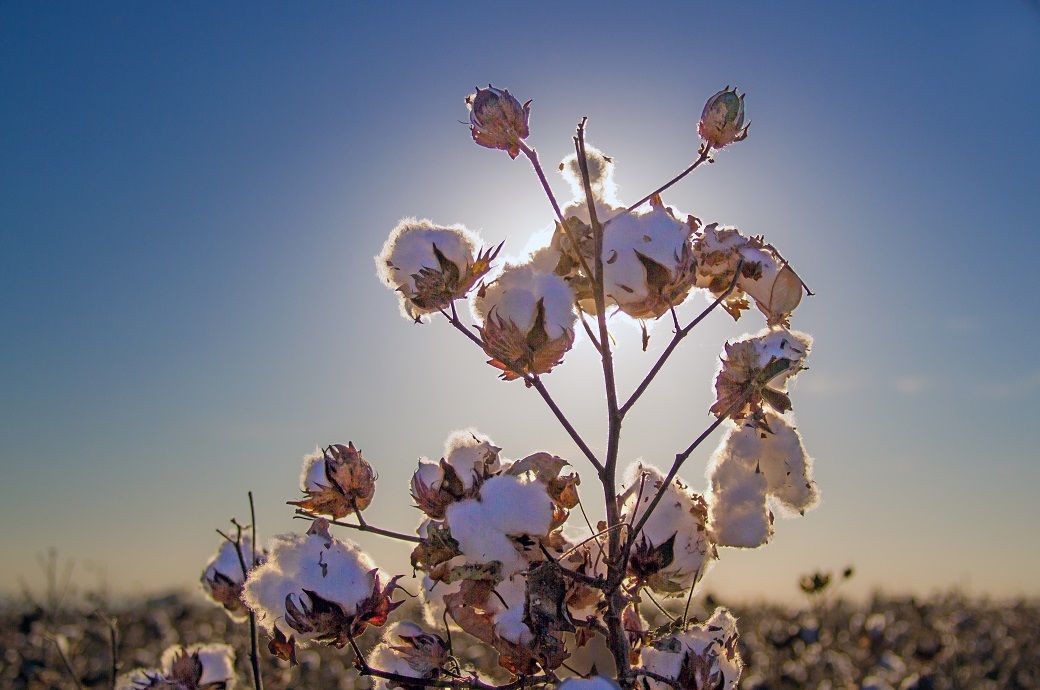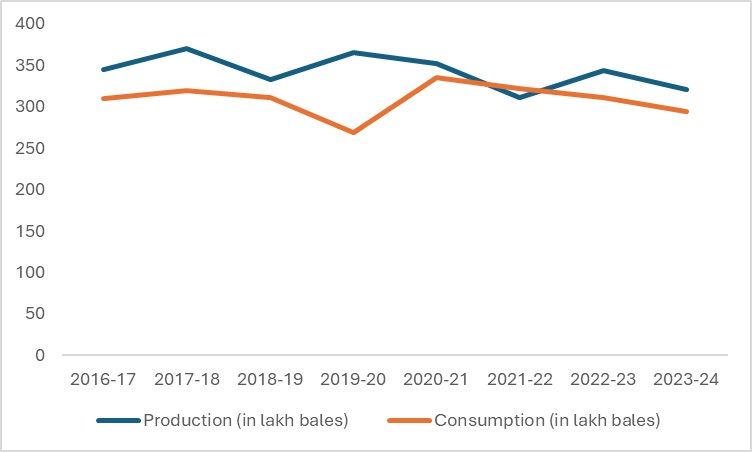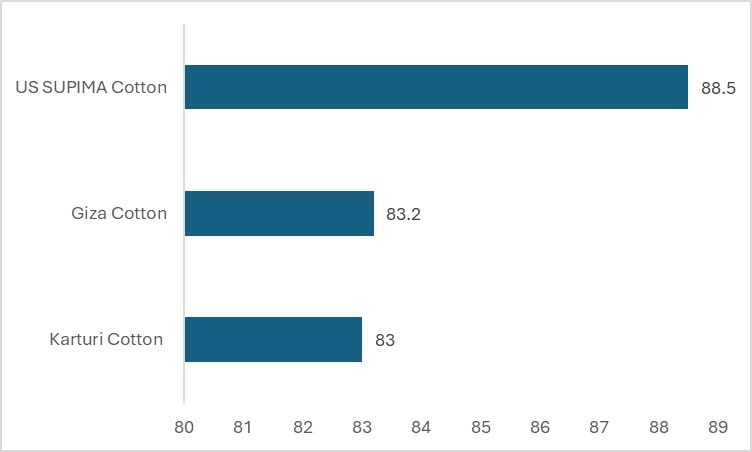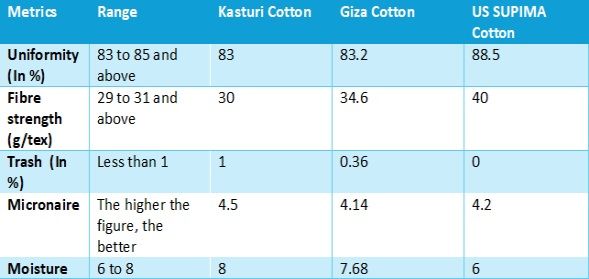
Increasing cotton consumption
According to a report by the Textile Commissioner, India consumes 95 per cent of the cotton it produces, with the remaining 5 per cent exported. As the world's largest cotton producer, enhancing the marketability and visibility of Indian cotton in the international market by selling it under a brand name is crucial.
Figure 1: Domestic consumption and production of cotton

Source: Digital Sansad
Tracing the sustainable pathway
Kasturi cotton launched by the Indian government adheres to all sustainability criteria. The government has mandated the following of sustainability norms in cotton production. Given the high water consumption associated with cotton cultivation, the government, in its recent ICAC plenary meeting, promoted Kasturi cotton as traceable, sustainable, and possessing qualities akin to other premium cotton brands considered organic.
The primary reason for promoting Kasturi as a brand was the potential presence of cotton varieties in the domestic market with similar quality but lacking visibility internationally due to the absence of a brand name. With the Kasturi Brand certification, there will be an Indian cotton brand poised to enhance the visibility of Indian cotton worldwide.
Cotton metrics and international brands
Globally, there are two premium cotton brands—Egyptian Giza and US’ Supima. Cotton sold under these brands is of premium quality and possesses some of the highest quality metrics compared to other cotton varieties. Having such a brand in India, which can come close to fulfilling such quality metrics, can itself ensure a higher premium for the country's farmers. Currently, India imposes a 10 per cent duty on the import of such premium cotton varieties to protect domestic cotton producers.
Egyptian Giza cotton is one of the most sought-after premium cotton varieties in the world. This cotton yields some of the strongest quality fibres, a guarantee unmatched by any other cotton globally. The region's climate and agricultural practices contribute to making Egyptian cotton highly desirable. Supima cotton from the US also commands a higher price due to its superior purity and strength in fibres. Many luxury brands utilise Supima cotton to create high-quality and long-lasting apparel. Both Giza and Supima cotton boast the highest uniformity, lowest trash content, and greatest fibre strength, earning them a premium price and a reputation as the most prestigious cotton varieties available.
Figure 2: Uniformity index of Kasturi Cotton, Egyptian Giza and Supima

Source: ICAC, Kasturi Cotton, Supima
As depicted in Figure 2, there is a clear distinction. Uniformity, which affects the quality of the yarn and the spinning efficiency in the value chain, is the most important factor in determining yarn quality. Supima cotton exhibits the highest uniformity, followed by Giza, and then Kasturi cotton. According to international metrics, a uniformity index in the range of 83 to 84 per cent is considered good, and above 85 per cent is considered the best. Kasturi cotton shares the same uniformity index, qualifying it as being of the highest quality. This holds true for other metrics as well. Table One demonstrates that Kasturi cotton falls within a similar range, qualifying as good to the best quality cotton, compared to Egyptian Giza and Supima.
Table 1: Quality comparison of Kasturi, Giza and Supima

Source: ICAC and Kasturi Cotton
One thing can be inferred for sure from the cotton metric comparison. If more efforts are made to reduce the trash content and improve fibre strength, this cotton brand can give a tough fight to all the premium cotton brands in the international market. Currently, when speaking of the international market, these two cotton varieties are the most sought after.
The government of India is doing its bit in promoting cotton and ensuring its increased visibility. The ministry is signing MOUs with the Texprocil and the Cotton Corporation of India to certify the cotton to be sold under the brand name. The above-mentioned metrics are to be considered and implemented rigorously when certifying cotton as a Kasturi brand.
The cotton brand is also on par with the sustainability that both the cotton brands tend to fulfil. Therefore, if the current initiative of the government becomes a success, nothing can be more rewarding for the agricultural sector of the country as it can boost exports and also promote more usage of organic cotton in the domestic market.
Road ahead
The brand extensively promoted by the government of India is approaching the quality standards of the other two prestigious cotton brands. India boasts a cotton variety, SUVIN, comparable to the renowned Egyptian Giza. Introducing a brand that adheres to sustainability norms such as traceability can enhance India's image as one of the largest producers and consumers of cotton. Moreover, it could spark a revolution in the agricultural sector itself. With India already producing approximately 51 per cent of the world's organic cotton, obtaining a brand certification like Kasturi is poised to elevate India's reputation as a major organic cotton producer. This certification also positions Indian cotton on par with the world's most premium brands while meeting traceability requirements, a crucial aspect of the textile industry's value chain. The introduction of an organic cotton brand like Kasturi demonstrates India's commitment to its domestic industry and aligns with the adage, 'Charity begins at home.'
ALCHEMPro News Desk (KL)
Receive daily prices and market insights straight to your inbox. Subscribe to AlchemPro Weekly!